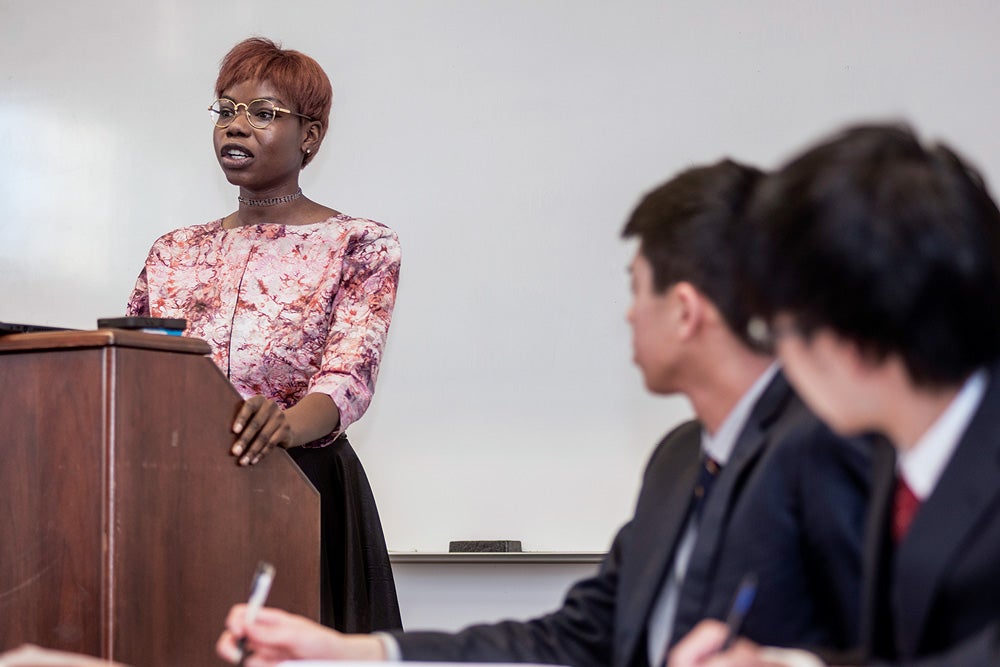The Art of Argument
This election season, you might be forgiven for thinking that reasoned examination of the issues and passionate but cordial disagreement are quaint relics of the past. Meet the members of the Debate Union, who have revived a club with a rich history, and are honing skills that have never been more relevant, or desperately needed, than they are now.
By Ellen Liberman
“The House regrets the politicization of tragic events.”
“The House” was a dozen students, their wheeled desks in a ragged circle in a basement room in Davis Hall. The tragic event was the November 13 Paris terrorist attacks that left 130 dead and 368 injured; and “the politicization,” the French flag overlay on Facebook profile images.
With 15 minutes to sharpen their arguments, they swiftly broke into two-person teams, representing the Government and the Opposition. For one hour, they tangoed up and down the issue, marshalling everything from #BlackLivesMatter to the ALS ice bucket challenge to their cause, with much stumbling over the word “politicization,” occasional banging of tables in agreement and a sprinkling of “Hear! Hear!”.
When the dance was done, the judges ranked the teams and the House scattered, to return two days later for another practice.
After a seven-year hiatus, debate is back at URI. It may occupy the arcane corners of clubdom with its many variations—among them British Parliamentary, Model U.N., Policy, Karl Popper and Lincoln Douglas-style debate—each with a different emphasis, format and rules. But its adherents are passionate. And all forms celebrate the art of argument, well-constructed, logically coherent and delivered with spirit.
“Debate is about being better intellectually,” says Bunmi Olatunji ’17. She started debating at 13 years old and is now the president of the URI Debate Union. “It’s a place to learn and meet other intellectuals. I was very shy. I was bullied at school and I had a hard time speaking to people. Debate has given me a community and a confidence in my abilities. I still struggle with being shy, but even if I’m in a situation that is not comfortable, I know I can speak and I can talk to people. It changed my life.”
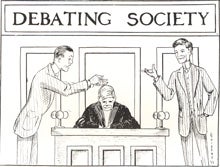
The current team of about 25 members hails from a wide range of disciplines—communications, computer programming, political science, philosophy, pre-veterinary sciences—bonded together by an abiding interest in current events beyond the winner of American Idol. Some, like Tabatha Lewis ’18, are novices. An environmental sciences major, Lewis never liked public speaking, but she always enjoyed arguing in her classes.
“I was just looking online for a club to join,” she says. “I had no idea when I went in, but it’s more fun than I imagined. You gain a better perspective about life and it expands your knowledge.”
Olatunji and others came to URI experienced in policy-style debates, in which a single resolution—usually regarding a change in a policy of the federal government—is tackled over the course of a year. Policy debaters bury themselves in research, squirreling enough information and references to spew their arguments at the rate of more than 350 words a minute.
The group meets twice a week to practice in the parliamentary-style format. Unlike policy debate’s deep dive into the facts, parliamentary style emphasizes persuasive rhetoric and an ability to think quickly. In one tournament, two-person teams—two representing the government’s affirmative view and two representing the opposition’s negative view—will debate several topics without advance notice, and with fewer than 20 minutes to prepare.
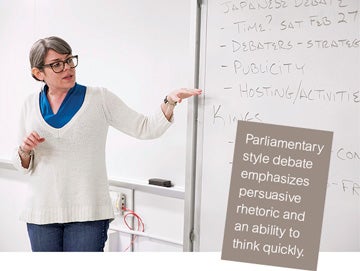
Catherine Morrison, a lecturer in the Harrington School of Communication and Media and director of debate, relaunched the club in the British Parliamentary style out of practical and philosophical “concerns with the direction policy debate was taking, and I didn’t think it was a format accessible for new debaters,” she says. “The idea behind parliamentary debate is to produce well-rounded students who are up on the issues of the day. It frowns on specialized knowledge and focuses more on eloquence and thinking on your feet.”
Debate has its roots in ancient Greece, but the collegiate debate tradition was established in the early 19th century. College debating clubs, such as the Cambridge Union Society, founded in 1815, flourished in an authoritarian educational system as a venue where students could discuss the topics they were interested in, Morrison says. Debate at what was then the Rhode Island College of Agriculture and Mechanic Arts was less about intellectual freedom than about polishing the college’s working- and middle-class students. The University’s first debate club coalesced in 1904, with five students and the goal of teaching “every man to think on his feet and to give him confidence for the expression of those thoughts. It is absolutely necessary that the present-day citizen be able to express himself, in town and school meetings, on all questions that concern his welfare.”
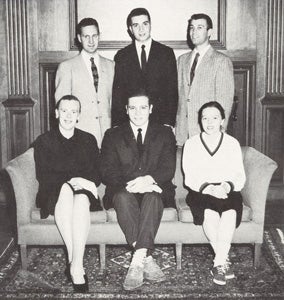
By the time Communication Studies Professor Emerita Agnes G. Doody, Hon. ’84, arrived at URI in 1958, the franchise had taken on a genteel mantle she did not care for. Dubbed the Little Rest Debating Society, it conjured images of teacups and musty parlors. Doody saw an opportunity for remaking a sleepy society into a crack policy debate team that could take on all comers. The first thing she did was change the name to the Forensic Debate Team.
“It was very relaxed. But I didn’t want them to think that they could rest a little,” she jokes. The group had been under the auspices of the Department of Speech and Theatre, where the emphasis was on the latter.
“The head of the department was a director of plays and he couldn’t care less about speech. I cared passionately about it,” Doody says. In her estimation, the URI team suffered an inferiority complex—at the time, URI was still considered a “cow college,” even though it had transitioned to a university seven years earlier. It didn’t help that the Ivy League’s Brown University was only 32 miles away. And the administration wasn’t inclined to argue. There was only a small budget for tournament travel, and then-President Francis Horn thought the debate team should stay at the local YMCA.
Doody had other ideas.
“I said that we are going to stay in the same kind of hotels that the best teams go to. That’s all part of your image and your self-esteem. I wanted the kids to think differently about themselves. We had training sessions at the UClub so they would use the dining room. I was death on manners.”
Doody’s determination to send forth the Forensic Debate Team in grand style apparently bothered Horn so much, he reportedly asked retired public speaking professor, Lee Polk, then a URI faculty candidate, in a job interview: “Do you think it’s really necessary to house debaters at the Waldorf in New York City? I don’t even stay there.”
Doody ran the team until 1965, when she handed off the directorship to a series of coaches, among them Stephen Wood, professor of communication studies, who held the post for a decade. During this era, URI became a competitive policy debate team on the regional and national circuit. But in 2008, the club went dormant.
That was also the year that Morrison joined the University staff as a lecturer, teaching argumentation and debate. She was still a graduate student in the University of Pittsburgh’s Department of Communications, working on her dissertation. She had been an accomplished policy debater in high school and college, but she wasn’t tapped to revive the debate team until 2014. The debate club actually had had an endowment since 2005, a $123,000 gift from the estate of a former URI debater, Martha McCormick Kelly ’37. But the fund could only be administered by the director of debate, so it sat untapped until Morrison was officially designated. Then, it took a couple of years before she found a core of students who had debated in high school and wanted to continue here. She was eager for the club to coalesce.
“I’m an evangelist for debate,” she says.
Her students are, too. Several mentor their counterparts in the Rhode Island Urban Debate League. Founded with Brown University’s Swearer Center for Public Service in 1999, the program draws debaters from 10 high schools in Providence, Central Falls, Woonsocket and Pawtucket.
“This is one of most exciting trends in the league’s history,” says Executive Director Ashley Belanger. “Students who graduate from the program want to give back because they recognize the value of it in their lives and want to pay it forward. It’s very cool to see things from both perspectives: the URI students taking pride and ownership in being a part of the league from a different side; and the students who debated with them during their freshman year, who see them now as role models who can talk about the college experience.”
Kamil Bahit ’18, who at just 19 is a sophomore and an alum of the high school league, has served as a tournament judge. A graduate of Woonsocket High School, he says that debate has shaped him and his career aspirations.
“It’s an activity other than talking—you do have to be a good listener for the majority of the debate, and it helps you understand how people think differently than you. Different people come up with crazy ideas, and you have to deal with unorthodox thinking,” he says. A pre-med student, Bahit is thinking of combining medicine and debate into a position in public health: “I see myself getting engaged in the legislative process. This is especially important now that the government is increasing its intervention in our health care system.”
On a warm December Saturday, the Debate Union hosted the high school league’s Ugly Sweater Bash, in which the combatants fought over the proposition that: “The United States federal government should substantially curtail its domestic surveillance.” While Olatunji, a coach and judge, kept time for the final round in the Agnes G. Doody Auditorium, the rest of the URI team relaxed over pizza in a Swan Hall classroom. The team had just competed in its second intercollegiate tournament at the University of Vermont, and the occasion marked a moment of full circle: The Rhode Island College of Agriculture and Mechanic Arts’ first debate club also met in a basement room in Davis Hall. Its first contest pitted the five-man team against the Farmers and the Poultry clubs. And although the Debate Club got its coop cleaned, according to a report in the archives, “it is felt that the Debating Club acquitted itself creditably.”
Similarly, URI’s newest debate club did not bring home any trophies in its latest outing, but felt it had a respectable showing. Arnav Doss ’17 teamed with Olatunji to debate the permissibility of religious symbols on memorial sites and whether the U.N. should save dying languages; they made it to the top bracket in the preliminary round.
Doss began debating in high school in the Model U.N. style, well prepared by evenings listening to the BBC and heated family political discussions. He came to URI in 2013 to study ocean engineering and was disappointed to discover there was no team.
“I always want to know what’s going on in the world, and debate is the place I can go and find other people I can discuss issues with. The tournament was fun. We learned a lot,” Doss says. “Then we got into the top bracket and we got destroyed.”
But he says it with a crocodile grin that gives his opponents their props—and relishes the prospect of a re-match. •
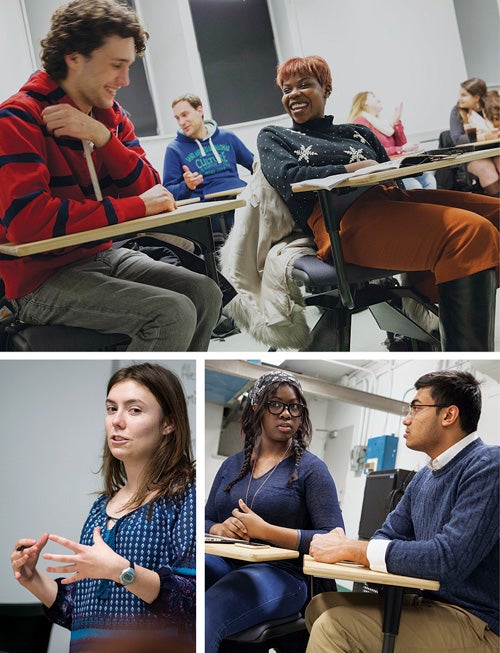
 Home
Home Browse
Browse Close
Close Events
Events Maps
Maps Email
Email Brightspace
Brightspace eCampus
eCampus



